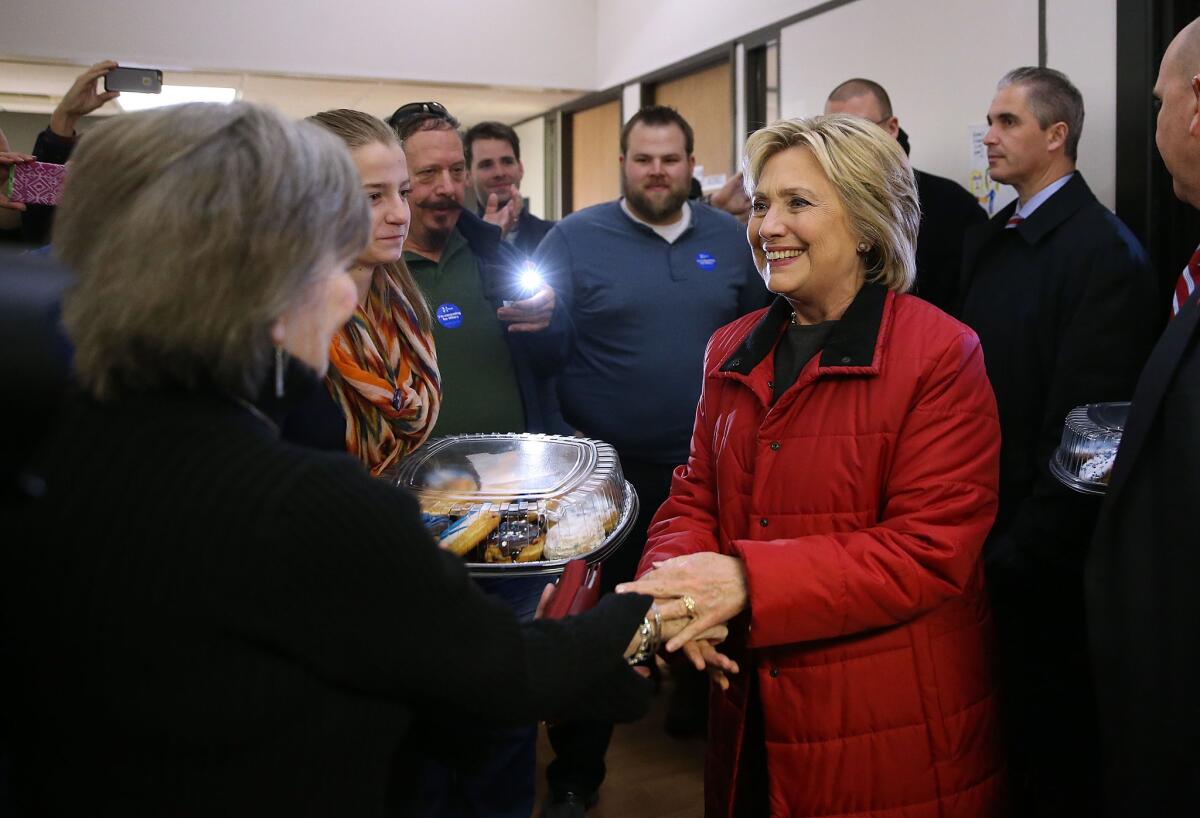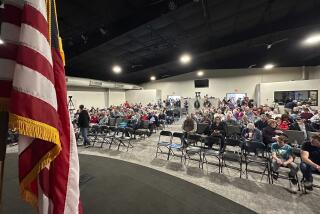Clinton ‘breathing a sigh of relief’ in Iowa as she holds razor-thin lead over Sanders

Hillary Clinton greets volunteers at a campaign office in Des Moines hours before the Iowa caucuses began.
Reporting from Des Moines — Hillary Clinton clung to the narrowest of leads as Iowa counted the returns from Monday’s precinct caucuses, seeking to hold off a strong challenge from Sen. Bernie Sanders with the support of older Democrats, self-described moderates and those who put a priority on a nominee with the experience to be president.
The razor-close vote count reflected an intense struggle that had tightened dramatically in recent weeks. But while Clinton’s lead was tiny — and a clear disappointment for her campaign — it was nonetheless critical. With Sanders leading in polls in New Hampshire, whose Feb. 9 primary is the next nominating contest, a clear defeat for Clinton here would have resuscitated all the doubts that Democrats have had about her ability to inspire and motivate the party’s voters.
Now, though Sanders clearly has sufficient money and ardent backing of his liberal supporters to challenge Clinton for months, the pressure will shift to him. Iowa, like New Hampshire, has a Democratic electorate made for a campaign like his — heavy with the liberal, white voters who have formed the core of his support. After next week, few states will be as congenial to him.
Speaking to supporters at a rally here as the final votes trickled in, Clinton declared she was “breathing a sigh of relief” and called for unity among Democrats. “We have to be united when it is all said and done … against a Republican vision and candidates who drive us apart and divide us,” she said as she ticked off a litany of Democratic goals, including combating climate change and a drive to “finish the job of universal healthcare coverage for every man, woman and child.”
Sanders, speaking just after Clinton, said that when he began his campaign, he had no organization, no money and was “taking on the most powerful political organization in the United States of America.” Now, he said, “while the results are still unknown, it looks like we are in a virtual tie.” Iowa, he said, had sent a “profound message” of change.
As the official results rolled in Monday night, a poll of voters entering the evening’s caucuses provided a picture of what went into their decision-making. Clinton had a huge margin among those Democrats — about 3 in 10 — who said their biggest concern about a nominee was having the right experience. By contrast, Sanders led strongly among those whose top priority was a president who “cares about people like me” or was “honest and trustworthy,” according to the entrance poll.
Former Maryland Gov. Martin O’Malley, who received less than 1% of the state’s Democratic delegates, announced he was suspending his campaign.
Among the group of polled voters who said experience was the top priority, Clinton won by roughly 10 to 1, according to the entrance poll, which was conducted for a consortium of television networks and the Associated Press. She also won heavily among a smaller group who said its top priority was to pick the nominee who could win the general election in November.
Sanders, by contrast, led by more than 2 to 1 among the roughly one-quarter of Democrats who said they were most concerned about having a nominee who cares about people like them. He had an even larger edge among another quarter of Democrats who said their top priority was a nominee who was “honest and trustworthy.”
That combination of Sanders’ perceived empathy and doubts about Clinton’s character were enough to erode the front-runner’s initial lead here despite her significant advantages. Up through nearly the end of 2015, Clinton appeared the prohibitive favorite here. Campaign aides spoke often of their determination to learn from her stinging defeat in 2008, in which she came in third in Iowa after appearing to many voters to have taken the state for granted.
This time, Clinton’s aides said, they would spare no effort to guarantee that every potential Clinton voter was identified, repeatedly contacted and delivered to the polls. The campaign has had paid staff in the state since April and by early summer boasted of having nearly 50 paid organizers here. Ultimately, they built volunteer field organizations in every one of Iowa’s 1,681 precincts, with volunteers knocking on nearly a quarter of a million doors over the last four days, according to the campaign’s data.
Since declaring her candidacy last spring, Clinton has held 106 events in the state, during 50 days of visits, according to a count by the Des Moines Register.
If voters “were willing to sit down and talk with us, we talked,” Kane Miller, the campaign’s organizing director in the Des Moines area, said in an interview earlier in the campaign.
“There’s no shortcuts in the Iowa caucus,” Miller added. “You can’t just come in late and throw a lot of hot sauce and hope it works.”
But by January, even that massive effort appeared in danger of falling short.
Clinton’s brand of pragmatic liberalism, backed by decades of experience, has won widespread admiration from Democrats — she retains a highly favorable image within the party’s ranks both nationally and in Iowa, polls show. But she has failed to ignite the sort of passionate excitement that Sanders has generated, particularly among younger voters.
Sanders’ emphasis on income inequality has particularly thrilled liberals. In the entrance poll, the Vermont senator led by about 2 to 1 among those caucus voters who said that was the most important issue to them.
Sanders led heavily among voters who identified themselves as “very liberal,” among those younger than 45 and those who, like him, identified themselves as independents, the entrance poll found.
By contrast, Clinton was winning among self-identified Democrats, as well as voters who identified themselves as “somewhat liberal” or “moderate” and those 45 and older, the entrance poll found. She also won among those who said their top concern was healthcare or the economy.
Another issue area, foreign policy, has been a strength for Clinton, the former secretary of State. For a brief moment late in 2015, after the terrorist attacks in Paris and San Bernardino focused voters’ attention on foreign affairs, her experience in that realm seemed to give her an unbeatable advantage over the Vermont senator.
But in the new year, Democratic voters quickly refocused on domestic policy, and last month, a flurry of polls showed Sanders rapidly closing the gap and perhaps overtaking her here, as he widened his lead in New Hampshire, which will hold its first-in-the-nation primary next week.
Those polls significantly upped the stakes for both campaigns and dredged up bitter memories of 2008 for many in Clinton’s circle.
Back when Sanders’ insurgency seemed a quixotic run destined to end early, even a narrow Iowa loss to the front-runner might have been counted as a huge moral victory.
But as Sanders’ campaign attracted growing amounts of money and intense devotion from the party’s liberal stalwarts, moral victories began to appear less satisfying. Sanders aides began to chart paths that could actually lead to the nomination; most began with a victory in Iowa.
As his campaign treasury swelled with millions of small donations, the political independent and democratic socialist from Vermont poured resources into the state.
He surpassed Clinton’s time in Iowa, spending parts of 60 days and holding 155 events, including huge rallies that drew thousands of fans, many of them young. Sanders has slightly outspent Clinton on television advertising nationwide to date, although in Iowa, Clinton spent $9 million to Sanders’ $7.4 million, as of the most recent figures compiled late last week by NBC News and the ad-tracking firm SMG Delta.
With talk of victory rising, the senator repeatedly tried to tamp down expectations in recent days, telling audiences that he could win, but only if Iowa Democrats turned out to vote in unusually large numbers.
“If we have a large voter turnout, if thousands of people — many of whom have given up on the political process, many young people who have never participated in the political process — if they come out, we’re going to win,” he said in a Monday morning interview on the “Today” show.
But regardless of either side’s spin, winning Iowa was critical to Sanders. While his base of support has been liberal, white Democrats, Clinton holds commanding leads nationwide among nonwhite voters and self-described moderate and conservative Democrats. Iowa is a state that is 93% white and, despite its somewhat conservative image, has a Democratic electorate that leans heavily to the left.
Indeed, a survey in early January by Ann Selzer, the state’s preeminent pollster, found that 43% of the state’s likely Democratic caucus goers described themselves as “socialist.”
Only New Hampshire and Sanders’ own Vermont have higher proportions of white liberals among their Democratic primary voters.
Late Monday night, Sanders’ campaign manager, Jeff Weaver, predicted the senator would “get a tremendous bounce out of Iowa.”
“We’re going to go to New Hampshire, where the senator is very, very popular, and then from there we’re going to go to Nevada and South Carolina,” he said. “An early success gives your candidate and your campaign credibility to future voters.”
But Sanders still faces the same hurdle he did before Iowa, persuading minority voters, who make up a large chunk of the Democratic vote nationwide, to back him over Clinton. A clear victory here might have advanced that cause; whether a near tie will do so will be a key question in the days and weeks ahead.
Times staff writers Kate Linthicum in Des Moines and Evan Halper in Washington contributed to this report.
For more, go to www.latimes.com/politics
ALSO:
This millennial illustrates why Iowa is a swing state
Everything you need to know about the Iowa caucuses and why they matter
From west to east, Iowa voters have starkly different realities and fears
More to Read
Get the L.A. Times Politics newsletter
Deeply reported insights into legislation, politics and policy from Sacramento, Washington and beyond. In your inbox three times per week.
You may occasionally receive promotional content from the Los Angeles Times.












